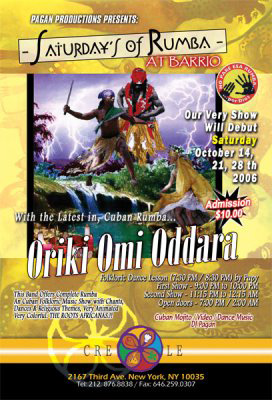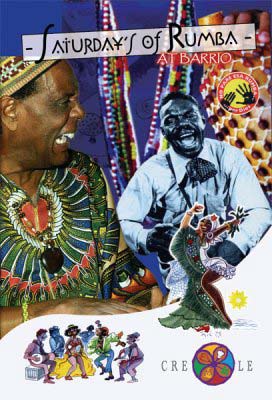

 |
AfroCubaWeb
|
 |
|
Schedule
Abakuá: continuation of the response to the statement by Iyamba, 5/4/07, by Roman Díaz Abakuá: la respuesta a esta frase de Iyamba continua, 4/5/07, de Roman Díaz www.orikiomioddara.com Roman Díaz at Ekpe Festival in Calabar, Nigeria Román Díaz Curriculum Vitae |
Roman Díaz y Omi OdaraRoman Díaz is a master percussionist from Havana, where he was trained by elders in the fine arts of classic Afro-Cuban musical traditions. In the USA, he organized a performance ensemble called "Omi Odara," a Lukumi phrase meaning "pure water," or "water that blesses," because "there is nothing more pure than water." They perform ritual Santeria, Abakua, and Palo Monte music, as well as continue the rumba and Son lineages of Arsenio Rodriguez, Chano Pozo, and Ignacio Pineiro's Septeto Nacional, all of whom drew upon Cuba's African heritage in their music. Contrary to the typical use of these traditions as "spice" for "world music", Diaz's ensemble is distinguished for respecting these traditions through artful and passionate performances based on deep ritual knowledge. They entertain while they educate. In the summer of 2001, Diaz and other Cuban Abakua met Efik Ekpe member Asuquo Ukpong at the Esquina Habanera in New Jersey; soon afterwards they performed at the Efik National Association meeting in New York, where they introduced the assembled Efiks to their cousins in Cuba.
|
La Rumba del dia 14 de Octubre se traslado para el Domingo 15 de Octubre a las 5:00 pm y se mantiene la Rumba del dia 28 de Octubre , 2006 a las 7:00 pm.
 |
Vuelve la Rumba al Barrio en el "CREOLE " Music and Club *Grupo folklorico "Orikí Omi Oddará"
|
 |
“New Evidence for the African Diaspora in the Cuban Abakua Society”
A lecture / performance by Dr. Ivor Miller, Copeland Fellow at Amherst College, accompanied by Omí Odara, a five member performance troupe directed by Roman Díaz, former member of the Cuban rumba group Yoruba Andabo, who was selected as a Latin Percussion representative in 2002. Mr. Díaz is a high level member of the Abakua society, and a distinguished member of the sacred bata drum guild, Añá. Omí Odara performed Ireme masquerade dances and related chants, originating in Calabar, Nigeria and recreated in 19th century Cuba, where they are integral to ceremony of the Abakua society.
|
Noches Cubanas: Chico Alvarez, Gene Golden, Orlando "Puntilla" Rios, Candido, Roman Diaz, "Pupi", & others.
Skirball Center @ NYU
566 LaGuardia Place at Washington Square South, NYC
The rich traditions of Afro-Cuban folklore were presented by leading Cuban artists living in North America. These programs of pulsating, soul-possessing and vibrant music and dance range from the secular to the sacred, including the fiery rumba as well as powerful chants, trance-inducing rhythms and dances associated with the Yoruba-based religious practices of lucumi. The concerts, under the direction of Chico Alvarez, featured Orlando "Puntilla" Rios, Gene Golden, Candido, Alfredo "Chocolate" Armenteros, Victor "Chino" Trias, Xiomara Rodriguez, Roman Diaz, "Pupi", Oriente Lopez, and others.
Roman Diaz with Latin Percussion Ensemble, 2002
content.congahead.com/galleries/montvaleflamingo/index.html
See also our Abakua page.
[AfroCubaWeb] [Site Map] [Music] [Arts] [Authors] [News] [Search this site]